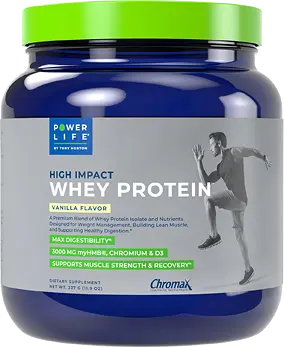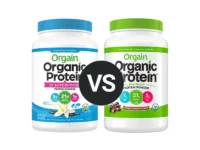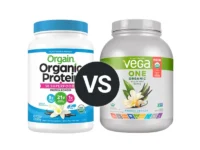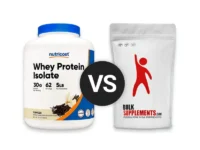Knowledge BaseYou're Questions Answered
Is protein powder necessary if I eat a high-protein diet?
Whether protein powder is necessary if you already follow a high-protein diet depends on various factors, including your dietary goals, lifestyle, and specific nutritional needs. While protein powders can offer convenience and additional benefits, they are not always essential if you are meeting your protein requirements through whole foods.
Protein Requirements and Sources
According to the RDA, the average adult requires about 0.36 grams of protein per pound (0.8 grams per kilogram) of body weight per day, although more recent research suggests an RDA should be at least 0.45 grams per pound. This is the minimum required to stave off malnutrition but is not the optimal protein intake for the average person. So this is a good place to start.
Protein intake requirements also increase based on activity level, age, and health goals. Athletes and those engaging in intense physical training may need more protein to support muscle repair and growth, often between 0.5 to 1.1 grams per pound (1.2 to 2.4 grams per kilogram) of body weight1. Whole food sources of protein such as meat, fish, eggs, dairy, legumes, nuts, and seeds can provide all essential amino acids, which are crucial for maintaining muscle mass and overall health.
Benefits of Protein Powder
Protein powders, including whey, casein, and plant-based options, can offer several advantages:
- Convenience: Easily incorporated into shakes, smoothies, and recipes, protein powders provide a quick and efficient way to boost protein intake, especially for those with busy schedules.
- Quality: High-quality protein powders can deliver a concentrated source of essential amino acids, particularly beneficial post-workout for muscle recovery and growth2.
- Digestibility: For individuals with digestive issues or those who find it challenging to consume large quantities of whole foods, protein powders can be a gentler option on the digestive system.
When Protein Powder May Be Unnecessary
If you already consume sufficient protein through a balanced diet, additional supplementation may not be necessary. Whole foods offer a range of nutrients beyond protein, including vitamins, minerals, and fiber, which are essential for overall health. Moreover, relying solely on protein powders can lead to a lack of dietary variety and potentially neglect other nutrient-dense foods.
Ultimately, the necessity of protein powder depends on your individual dietary habits, goals, and lifestyle. For many, achieving protein needs through whole foods is entirely feasible and beneficial. However, for those with higher protein demands or who require convenience, protein powders can be a valuable supplement.
- Institute of Medicine. (2005). Dietary Reference Intakes for Energy, Carbohydrate, Fiber, Fat, Fatty Acids, Cholesterol, Protein, and Amino Acids. National Academies Press.
- Phillips, S. M., & Van Loon, L. J. C. (2011). Dietary protein for athletes: From requirements to optimum adaptation. Journal of Sports Sciences, 29(sup1), S29-S38.
- Pasiakos, S. M., McLellan, T. M., & Lieberman, H. R. (2015). The effects of protein supplements on muscle mass, strength, and aerobic and anaerobic power in healthy adults: a systematic review. Sports Medicine, 45(1), 111-131.
Related Questions

Your Answer
We are a participant in the Amazon Services LLC Associates Program, an affiliate advertising program designed to provide a means for us to earn fees by linking to Amazon.com and affiliated sites.






